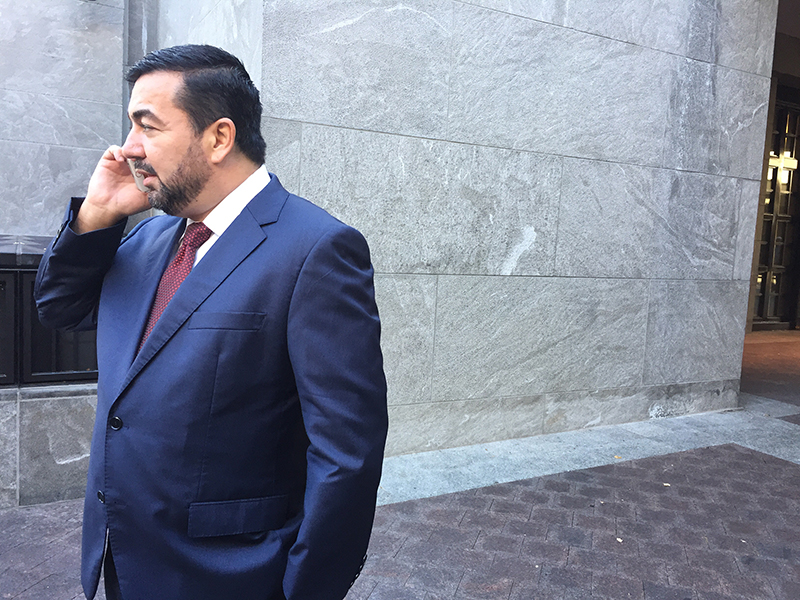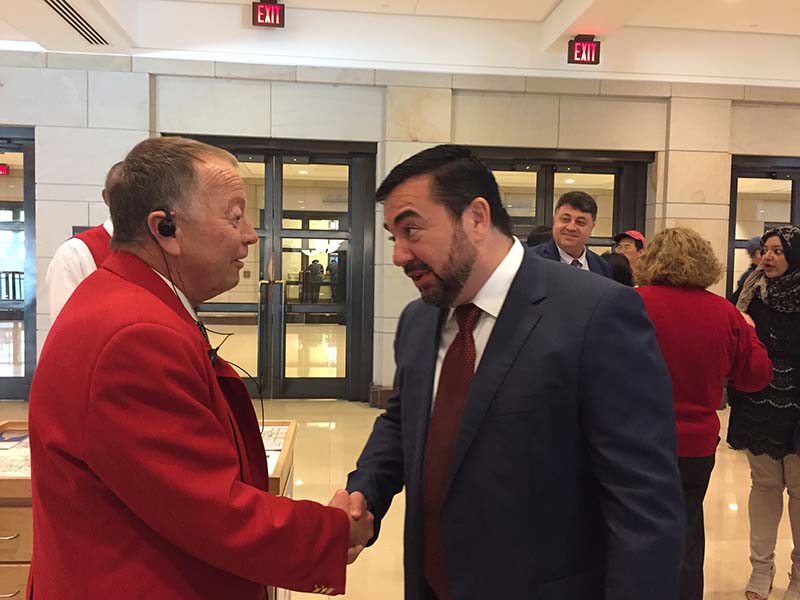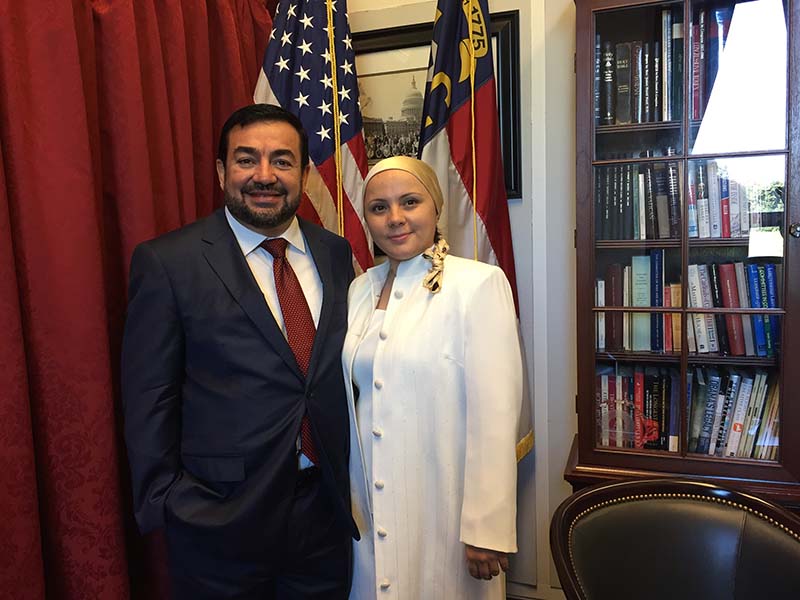Courtesy of Religion News

Abdullah Antepli outside the U.S. Capitol Visitor Center. RNS photo by Yonat Shimron
Abdullah Antepli, from Duke University in North Carolina, has the unusual honor of having done it twice.
At the invitation of his congressman, Rep. David Price, D-N.C., the imam took the podium on Wednesday (Oct. 4) and delivered a plea for celebrating differences.
“As the Creator of all, you made us different,” said Antepli, whose prayer opened the day’s proceedings. “Enable us to understand, appreciate and celebrate our differences.”
Antepli has carried that message to 74 countries around the world and it is one he pursues relentlessly in his role as chief representative of Muslim affairs at Duke University in Durham, N.C., as a kind of goodwill ambassador to the the country and the world.
Unlike many of the nation’s imams who are bound to the concerns of their specific religious communities, Antepli speaks with rare candor and challenges Americans to engage religions responsibly.
His first congressional opening prayer on March 3, 2010, thrust him into the limelight.
He was subsequently invited to participate in several State Department consultations, first under former Secretary of State Hillary Clinton and later under her successor, John Kerry. He traveled to Afghanistan and to Auschwitz, leading groups of U.S. Muslims. And he pioneered a new program promoting dialogue between Jews and Muslims in Israel called the Muslim Leadership Initiative.
“He’s a remarkable interfaith interlocutor,” said Price of Antepli. “He strives for full acceptance and appreciation of other traditions, not simply wanting mere tolerance but to really engage and talk about the substance of one’s faith.”

Abdullah Antepli greeting U.S. Capitol tour guide Joe Blair. RNS photo by Yonat Shimron
For Antepli, 44, the three-minute civic honor this week was both symbolic and deeply meaningful. As a native of Turkey who came to this country after serving in several countries as a faith-based humanitarian relief worker, Antepli takes great pride in the American experiment that mixes pluralism and religious freedom.
He was the first Muslim chaplain appointed to Duke University in 2008, and quickly developed a reputation as a passionate voice for Muslim acceptance.
“He’s someone who is not discouraged by apparently impossible divides between people,” said Ingrid Mattson, a professor of Islamic studies at Huron University College in Canada, who taught Antepli at Hartford Seminary’s Islamic Chaplaincy Program in the early 2000s.
“He believes that all people should be able to find something that unites them and can bring them together, even if they have very seemingly unmanageable gaps in their perspective or approaches,” Mattson said.
As he reflects on the past seven years, Antepli comes to a curious conviction: Things have gotten both better and worse — at the same time.
In 2010, when he first gave the opening prayer, the U.S. religious scene was far from idyllic.
Two Muslim men proposed to build an Islamic cultural center and mosque two blocks away from the ruins of the World Trade Center. The project, known alternately as Cordoba House and Park51 was probably best known as the “Ground Zero mosque” after a wave of anti-Muslim protesters claimed it would be disrespectful to the nearly 3,000 people killed on 9/11.
Meanwhile at a small Pentecostal church in Gainesville, Fla., Pastor Terry Jones was threatening to burn Qurans.
Muslim civil rights organizations were still inexperienced for the most part and just learning how to advocate for their community.
Seven years later, following a divisive presidential campaign in which candidate Donald Trump threatened “a total and complete shutdown of Muslims entering the United States” and later belittled the parents of a fallen U.S. Muslim soldier, Americans Muslims felt even more threatened.
Assaults and intimidation of Muslims rose steadily after Trump’s election and repeated travel bans have only served to put U.S. Muslims on the defensive.
On the other hand, Muslim groups have become far more sophisticated in their outreach. They have joined coalitions with other minority groups, including Jews and LGBT Americans — a posture many Muslims could not have imagined possible seven years ago. And they have done a better job advocating for themselves in the public square.
In this “bipolar” moment, as he calls it, Antepli is ever hopeful.
“For many people and certainly for my children, whatever might be coming out of the centers of powers regarding the Muslim community, there is a sense that this is a temporary crisis, that common sense will prevail,” he said. “If they stick to what they do and work hard and invest in their patriotism and contribution to American society, we will have a space.”

Abdullah Antepli and his wife Asuman in Congressman David Price’s office. Photo by Yonat Shimron
For Antepli, the past seven years have been auspicious.
His involvements grew so demanding that in 2014, Duke promoted him to the position of chief representative of Muslim affairs, a role that allows him to take on bigger policy issues involving Muslims, higher education and interfaith work.
“He has beautiful interpersonal skills and emotional intelligence and that’s really invaluable to the work he does,” said Imam Omer Bajwa, director of Muslim life at Yale University. “In this political climate we find ourselves in, to have someone that genuinely believes in the value of bridge building and community building is so invaluable.”
At heart, though, Antepli remains committed to education and chaplaincy, the work, he says he came to the U.S. to do.
Though chaplaincy has roots in the Christian tradition, Muslims have come to embrace it as a way of providing religious and institutional support not only in university settings, but also in prisons and hospitals.
Hartford Seminary’s Islamic Chaplaincy Program, from which Antepli graduated, accredits many of the nation’s chaplains.
In 1993, the U.S. Army appointed the first Muslim chaplain. That year, Wellesley became the first university to appoint a Muslim chaplain; Georgetown University followed. Today some two-dozen U.S. universities provide Muslim chaplains, including many elite schools: Harvard, Yale, Princeton, Cornell, and Tufts.
Antepli thinks college chaplains offer one of the most creative avenues for negotiating American Muslim identity. Both Northwestern University and Wellesley College have woman chaplains whereas debate about whether a woman can be an imam might go on “for the next 200 years and not go anywhere in many mosques,” he said.
Ultimately, Antepli is a believer in education, not politics. That’s one reason he spent his Washington trip talking to editors and reporters at the Chronicle of Higher Education and later serving on a panel discussing faith and public life at a Capitol Visitor Center breakfast.
“I really firmly believe the real change can come through education,” he said. “That’s the only trick I know that will wipe out hate, bigotry, exclusion.”
